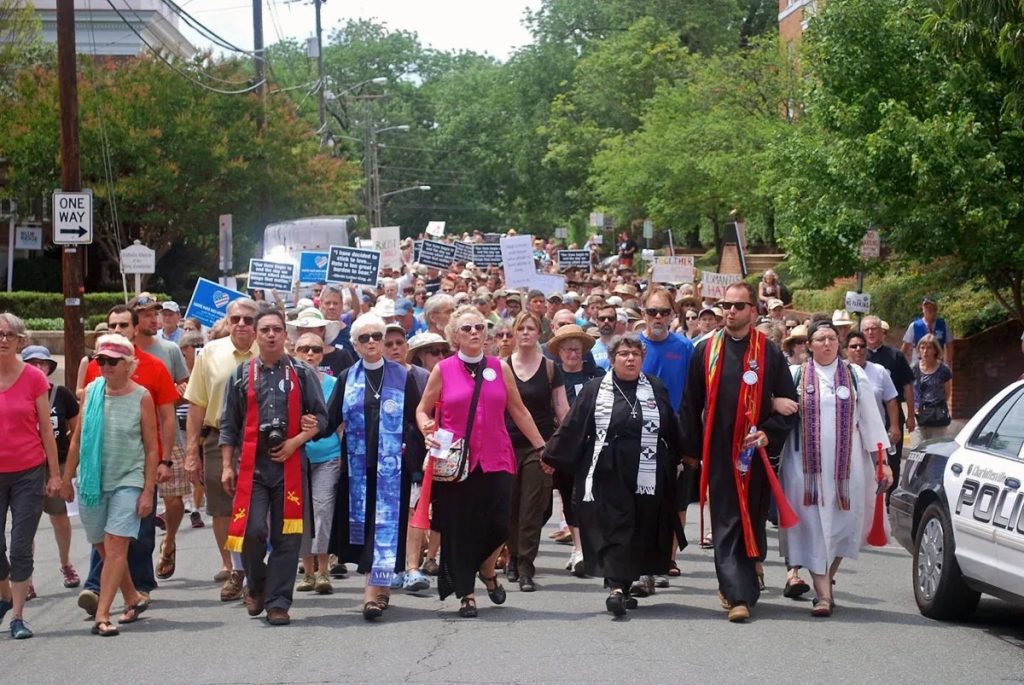
One topic we often find ourselves returning to in our conversations is the intersection between religion and politics. Generally speaking, this is something about this subject that our regular participants tend to broadly agree on: We want to see less of it. In short, we’re more comfortable when politics and religion stay on their respective sides of the fence, so to speak.
A new study released last week, however, offers some really interesting data on the political views of clergy and their congregations. And the insights here might we worth talking about. The focus of the study, conducted by the Public Religion Research Institute and released last Thursday, was on the political views of mainline Protestant clergy — Episcopalians, Evangelical Lutherans, United Methodists, Presbyterians, and so on — and how those align with the views of congregations they lead. The overall findings are contrasted with other research PRRI has done on the views of evangelical clergy and their flocks. Religion News Service summarized the study this way:
A new survey of mainline clergy finds those leading the historic denominations that once shaped the American Protestant scene are far more liberal than their congregants on a host of political and social issues.
The Public Religion Research Institute survey of 3,066 mainline clergy, released Thursday (Sept. 14), shows that about half identify with the Democratic Party, 28% identify as independents and only 14% as Republicans.
In this sense, they are the inverse of evangelical clergy, whom surveys find to be overwhelmingly conservative and vote Republican.
Mainline clergy are also more liberal than their congregants, who tend to be divided among Republicans (36%), independents (35%) and Democrats (24%).
These mainline clergy are more supportive than their congregants of LGBTQ rights, more likely to have opposed the overturn of Roe v. Wade and less likely to believe America is in danger of losing its culture and identity.
So here are the first few things to think about. Does this pattern surprise you at all? What do you think are the implications, in what ways do you think this difference in attitude matters? Do you think this is problematic either for clergy or for the congregations they lead?
There are some other interesting details that we can discuss as well. One of the findings is that while mainline Protestant clergy are overwhelmingly liberal, their churches harbor some of the last vestiges of ideological and partisan diversity among religious Americans. In 2020, while most white mainliners voted for Donald Trump in 2020 (57%), a sizable minority cast their ballot for Joe Biden (43%); by contrast, 84% of white evangelical Protestants backed Trump, and 91% of Black Protestants voted for Biden.
Likewise, Protestant clergy feel a sense of urgency about the need to speak to the important political and social issues that define our times. Eight in 10 mainline Protestant clergy (79%) agree that their congregations should get involved in social issues, even if that means having challenging conversations about politics. By contrast, fewer than half of white mainline congregants (43%) nationally agree with this sentiment.
Are you surprised to learn the extent of the diversity of political perspectives within congregations? Is this a strength or a weakness when it comes to building or maintaining community? What do you think this means in terms of holding such congregations together? Are we accepting of these differences, or not? Does this make you feel optimistic about the future, or does it worry you?
We’ll talk all about it in our discussion tomorrow evening, Tuesday Sept. 19, at Casa Real in downtown Oxford. The conversation begins at 7pm.